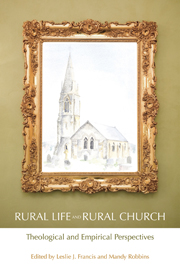Book contents
- Frontmatter
- Contents
- Preface
- Foreword by The Bishop of Shrewsbury, The Rt Revd Mark Rylands
- 1 Introduction: shaping rural theology
- PART 1 PERSPECTIVES FROM THE BIBLE
- PART 2 PERSPECTIVES FROM ORDINARY THEOLOGY
- 5 Ordinary theology for rural theology and rural ministry
- 6 The kneelers are most impressive: reflections on reading a visitors' book
- 7 Ordinary prayer and the rural church: an empirical study of prayer cards
- PART 3 THEOLOGICAL AND SOCIOLOGICAL PERSPECTIVES
- PART 4 HISTORICAL PERSPECTIVES
- PART 5 LISTENING TO VISITORS
- PART 6 LISTENING TO THE COMMUNITY
- PART 7 LISTENING TO CHURCHGOERS
- PART 8 LISTENING TO CHURCH LEADERS
- PART 9 SATISFACTION AND STRESS IN MINISTRY
- Contributors
- Sources
- Subject Index
- Name Index
6 - The kneelers are most impressive: reflections on reading a visitors' book
from PART 2 - PERSPECTIVES FROM ORDINARY THEOLOGY
- Frontmatter
- Contents
- Preface
- Foreword by The Bishop of Shrewsbury, The Rt Revd Mark Rylands
- 1 Introduction: shaping rural theology
- PART 1 PERSPECTIVES FROM THE BIBLE
- PART 2 PERSPECTIVES FROM ORDINARY THEOLOGY
- 5 Ordinary theology for rural theology and rural ministry
- 6 The kneelers are most impressive: reflections on reading a visitors' book
- 7 Ordinary prayer and the rural church: an empirical study of prayer cards
- PART 3 THEOLOGICAL AND SOCIOLOGICAL PERSPECTIVES
- PART 4 HISTORICAL PERSPECTIVES
- PART 5 LISTENING TO VISITORS
- PART 6 LISTENING TO THE COMMUNITY
- PART 7 LISTENING TO CHURCHGOERS
- PART 8 LISTENING TO CHURCH LEADERS
- PART 9 SATISFACTION AND STRESS IN MINISTRY
- Contributors
- Sources
- Subject Index
- Name Index
Summary
Abstract – The understanding of God and the expression of faith and belief which is articulated by ordinary people can be found in what they write in visitors' books as a response to their experience of looking around the church and its environs. In this article the record of a completed visitors' book was analysed using the analytic perspective of ordinary theology. The results show responses exhibiting spiritual reactions to the experience. They also suggest that visitors' books are perhaps not the most productive ways of seeking insights into the ‘God-talk’ of ordinary people, and that prayer trees or prayer boards could yield more productive results.
Introduction
According to the report Celebrating the Rural Church: ten years on from Faith in the Countryside (ACORA, 2000, p. 31), twenty-eight dioceses of the Church of England responded to questions regarding tourism, and some have set up appointments of Diocesan Tourism Officers to encourage rural churches to benefit from the growing number of those living in urban situations who take short holidays and days out in the countryside. This interest in encouraging rural churches to find in tourism opportunities for their own mission to visitors, as well as providing benefits of a spiritual and recuperative kind for visitors, has been strongly encouraged by the Arthur Rank Centre through the Hidden Britain Programme (2007). This is designed to promote tourism which could bring clear community benefits of different kinds to rural villages, and several Hidden Britain Centres have already been established (Country Way, 2007). The benefit of such promotion also extends to village churches in rural settings which have been persuaded to open their doors once more for the sake of their own interests and that of tourists who are attracted to the open countryside and its villages.
- Type
- Chapter
- Information
- Rural Life and Rural ChurchTheological and Empirical Perspectives, pp. 52 - 63Publisher: Acumen PublishingPrint publication year: 2012



